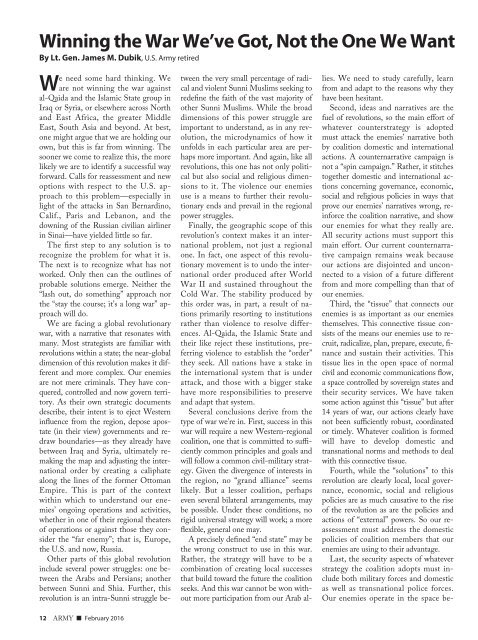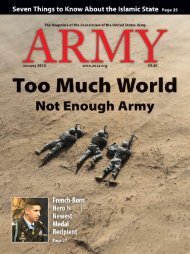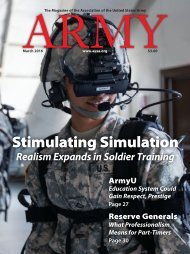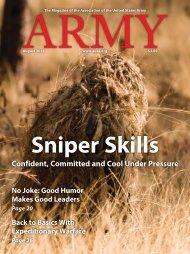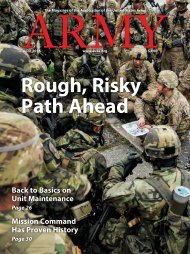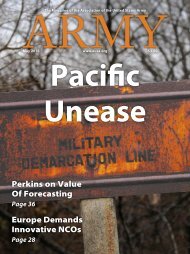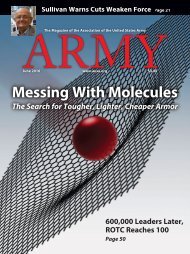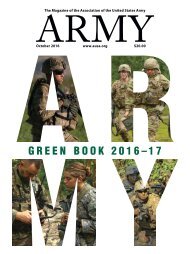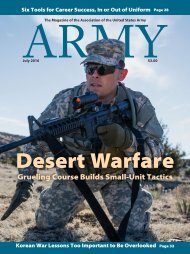Army - Kicking Tires On Jltv
You also want an ePaper? Increase the reach of your titles
YUMPU automatically turns print PDFs into web optimized ePapers that Google loves.
Winning the War We’ve Got, Not the <strong>On</strong>e We Want<br />
By Lt. Gen. James M. Dubik, U.S. <strong>Army</strong> retired<br />
We need some hard thinking. We<br />
are not winning the war against<br />
al-Qaida and the Islamic State group in<br />
Iraq or Syria, or elsewhere across North<br />
and East Africa, the greater Middle<br />
East, South Asia and beyond. At best,<br />
one might argue that we are holding our<br />
own, but this is far from winning. The<br />
sooner we come to realize this, the more<br />
likely we are to identify a successful way<br />
forward. Calls for reassessment and new<br />
options with respect to the U.S. approach<br />
to this problem—especially in<br />
light of the attacks in San Bernardino,<br />
Calif., Paris and Lebanon, and the<br />
downing of the Russian civilian airliner<br />
in Sinai—have yielded little so far.<br />
The first step to any solution is to<br />
recognize the problem for what it is.<br />
The next is to recognize what has not<br />
worked. <strong>On</strong>ly then can the outlines of<br />
probable solutions emerge. Neither the<br />
“lash out, do something” approach nor<br />
the “stay the course; it’s a long war” approach<br />
will do.<br />
We are facing a global revolutionary<br />
war, with a narrative that resonates with<br />
many. Most strategists are familiar with<br />
revolutions within a state; the near-global<br />
dimension of this revolution makes it different<br />
and more complex. Our enemies<br />
are not mere criminals. They have conquered,<br />
controlled and now govern territory.<br />
As their own strategic documents<br />
describe, their intent is to eject Western<br />
influence from the region, depose apostate<br />
(in their view) governments and redraw<br />
boundaries—as they already have<br />
between Iraq and Syria, ultimately remaking<br />
the map and adjusting the international<br />
order by creating a caliphate<br />
along the lines of the former Ottoman<br />
Empire. This is part of the context<br />
within which to understand our enemies’<br />
ongoing operations and activities,<br />
whether in one of their regional theaters<br />
of operations or against those they consider<br />
the “far enemy”; that is, Europe,<br />
the U.S. and now, Russia.<br />
Other parts of this global revolution<br />
include several power struggles: one between<br />
the Arabs and Persians; another<br />
between Sunni and Shia. Further, this<br />
revolution is an intra-Sunni struggle between<br />
the very small percentage of radical<br />
and violent Sunni Muslims seeking to<br />
redefine the faith of the vast majority of<br />
other Sunni Muslims. While the broad<br />
dimensions of this power struggle are<br />
important to understand, as in any revolution,<br />
the microdynamics of how it<br />
unfolds in each particular area are perhaps<br />
more important. And again, like all<br />
revolutions, this one has not only political<br />
but also social and religious dimensions<br />
to it. The violence our enemies<br />
use is a means to further their revolutionary<br />
ends and prevail in the regional<br />
power struggles.<br />
Finally, the geographic scope of this<br />
revolution’s context makes it an international<br />
problem, not just a regional<br />
one. In fact, one aspect of this revolutionary<br />
movement is to undo the international<br />
order produced after World<br />
War II and sustained throughout the<br />
Cold War. The stability produced by<br />
this order was, in part, a result of nations<br />
primarily resorting to institutions<br />
rather than violence to resolve differences.<br />
Al-Qaida, the Islamic State and<br />
their like reject these institutions, preferring<br />
violence to establish the “order”<br />
they seek. All nations have a stake in<br />
the international system that is under<br />
attack, and those with a bigger stake<br />
have more responsibilities to preserve<br />
and adapt that system.<br />
Several conclusions derive from the<br />
type of war we’re in. First, success in this<br />
war will require a new Western-regional<br />
coalition, one that is committed to sufficiently<br />
common principles and goals and<br />
will follow a common civil-military strategy.<br />
Given the divergence of interests in<br />
the region, no “grand alliance” seems<br />
likely. But a lesser coalition, perhaps<br />
even several bilateral arrangements, may<br />
be possible. Under these conditions, no<br />
rigid universal strategy will work; a more<br />
flexible, general one may.<br />
A precisely defined “end state” may be<br />
the wrong construct to use in this war.<br />
Rather, the strategy will have to be a<br />
combination of creating local successes<br />
that build toward the future the coalition<br />
seeks. And this war cannot be won without<br />
more participation from our Arab allies.<br />
We need to study carefully, learn<br />
from and adapt to the reasons why they<br />
have been hesitant.<br />
Second, ideas and narratives are the<br />
fuel of revolutions, so the main effort of<br />
whatever counterstrategy is adopted<br />
must attack the enemies’ narrative both<br />
by coalition domestic and international<br />
actions. A counternarrative campaign is<br />
not a “spin campaign.” Rather, it stitches<br />
together domestic and international actions<br />
concerning governance, economic,<br />
social and religious policies in ways that<br />
prove our enemies’ narratives wrong, reinforce<br />
the coalition narrative, and show<br />
our enemies for what they really are.<br />
All security actions must support this<br />
main effort. Our current counternarrative<br />
campaign remains weak because<br />
our actions are disjointed and unconnected<br />
to a vision of a future different<br />
from and more compelling than that of<br />
our enemies.<br />
Third, the “tissue” that connects our<br />
enemies is as important as our enemies<br />
themselves. This connective tissue consists<br />
of the means our enemies use to recruit,<br />
radicalize, plan, prepare, execute, finance<br />
and sustain their activities. This<br />
tissue lies in the open space of normal<br />
civil and economic communications flow,<br />
a space controlled by sovereign states and<br />
their security services. We have taken<br />
some action against this “tissue” but after<br />
14 years of war, our actions clearly have<br />
not been sufficiently robust, coordinated<br />
or timely. Whatever coalition is formed<br />
will have to develop domestic and<br />
transnational norms and methods to deal<br />
with this connective tissue.<br />
Fourth, while the “solutions” to this<br />
revolution are clearly local, local governance,<br />
economic, social and religious<br />
policies are as much causative to the rise<br />
of the revolution as are the policies and<br />
actions of “external” powers. So our reassessment<br />
must address the domestic<br />
policies of coalition members that our<br />
enemies are using to their advantage.<br />
Last, the security aspects of whatever<br />
strategy the coalition adopts must include<br />
both military forces and domestic<br />
as well as transnational police forces.<br />
Our enemies operate in the space be-<br />
12 ARMY ■ February 2016


